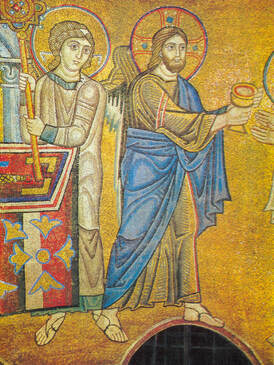Holy Eucharist
The holy Eucharist completes Christian initiation. Those who have been raised to the dignity of the royal priesthood by Baptism and configured more deeply to Christ by Confirmation participate with the whole community in the Lord’s own sacrifice by means of the Eucharist. CCC 1322
“At the Last Supper, on the night he was betrayed, our Savior instituted the Eucharistic sacrifice of his Body and Blood. This he did in order to perpetuate the sacrifice of the cross throughout the ages until he should come again, and so to entrust to his beloved Spouse, the Church, a memorial of his death and resurrection: a sacrament of love, a sign of unity, a bond of charity, a Paschal banquet ,in which Christ is consumed, the mind is filled with grace, and a pledge of future glory is given to us.’” (Sacrosanctum Concilium) CCC 1323
The Eucharist is “the source and summit of the Christian life.” (Lumen Gentium) “The other sacraments, and indeed all ecclesiastical ministries and works of the apostolate, are bound up with the Eucharist and are oriented toward it. For in the blessed Eucharist is contained the whole spiritual good of the Church, namely Christ himself, our Pasch”(Presbyterorum Ordinis) CCC 1324
“At the Last Supper, on the night he was betrayed, our Savior instituted the Eucharistic sacrifice of his Body and Blood. This he did in order to perpetuate the sacrifice of the cross throughout the ages until he should come again, and so to entrust to his beloved Spouse, the Church, a memorial of his death and resurrection: a sacrament of love, a sign of unity, a bond of charity, a Paschal banquet ,in which Christ is consumed, the mind is filled with grace, and a pledge of future glory is given to us.’” (Sacrosanctum Concilium) CCC 1323
The Eucharist is “the source and summit of the Christian life.” (Lumen Gentium) “The other sacraments, and indeed all ecclesiastical ministries and works of the apostolate, are bound up with the Eucharist and are oriented toward it. For in the blessed Eucharist is contained the whole spiritual good of the Church, namely Christ himself, our Pasch”(Presbyterorum Ordinis) CCC 1324
The Institution of the Eucharist

The Lord, having loved those who were his own, loved them to the end. Knowing that the hour had come to leave this world and return to the Father, in the course of a meal he washed their feet and gave them the commandment of love (Cf. Jn 13:1-17;34-35). In order to leave them a pledge of this love, in order never to depart from his own and to make them sharers in his Passover, he instituted the Eucharist as the memorial of his death and Resurrection, and commanded his apostles to celebrate it until his return; “thereby he constituted them priests of the New Testament.” (Council of Trent, 1562) CCC 1337
The three synoptic Gospels and St. Paul have handed to us the account of the institution of the Eucharist; St. John, for his part, reports the words of Jesus in the synagogue of Capernaum that prepare for the institution of the Eucharist: Christ calls himself the bread of life, come down form heaven. (Cf. Jn 6) CCC 1338
Jesus chose the time of Passover to fulfill what he had announced at Capernaum: giving his disciples his Body and his Blood:
The three synoptic Gospels and St. Paul have handed to us the account of the institution of the Eucharist; St. John, for his part, reports the words of Jesus in the synagogue of Capernaum that prepare for the institution of the Eucharist: Christ calls himself the bread of life, come down form heaven. (Cf. Jn 6) CCC 1338
Jesus chose the time of Passover to fulfill what he had announced at Capernaum: giving his disciples his Body and his Blood:
- Then came the day of Unleavened Bread, on which the passover lamb had to be sacrificed. So Jesus sent Peter and John, saying, “Go and prepare the passover meal for us, that we may eat it... They went...and prepared the passover. And when the hour came, he sat at table, and the apostles with him. And he said to them, “I have earnestly desired to eat this passover with you before I suffer; for I tell you I shall not eat it again until it is fulfilled in the kingdom of God.” ...And he took bread, and when he had given thanks he broke it and gave it to them, saying, “This is my body which is given for you. Do this in remembrance of me.” And likewise the cup after supper, saying, “This cup which is poured out for you is the New Covenant in my blood.” (Lk 22:7-20; cf. Mt 26:17-29; Mk 14:12-25; 1 Cor 11:23-26) CCC 1339
© Copyright 2024 St. Birgitta Catholic Church. All rights reserved.